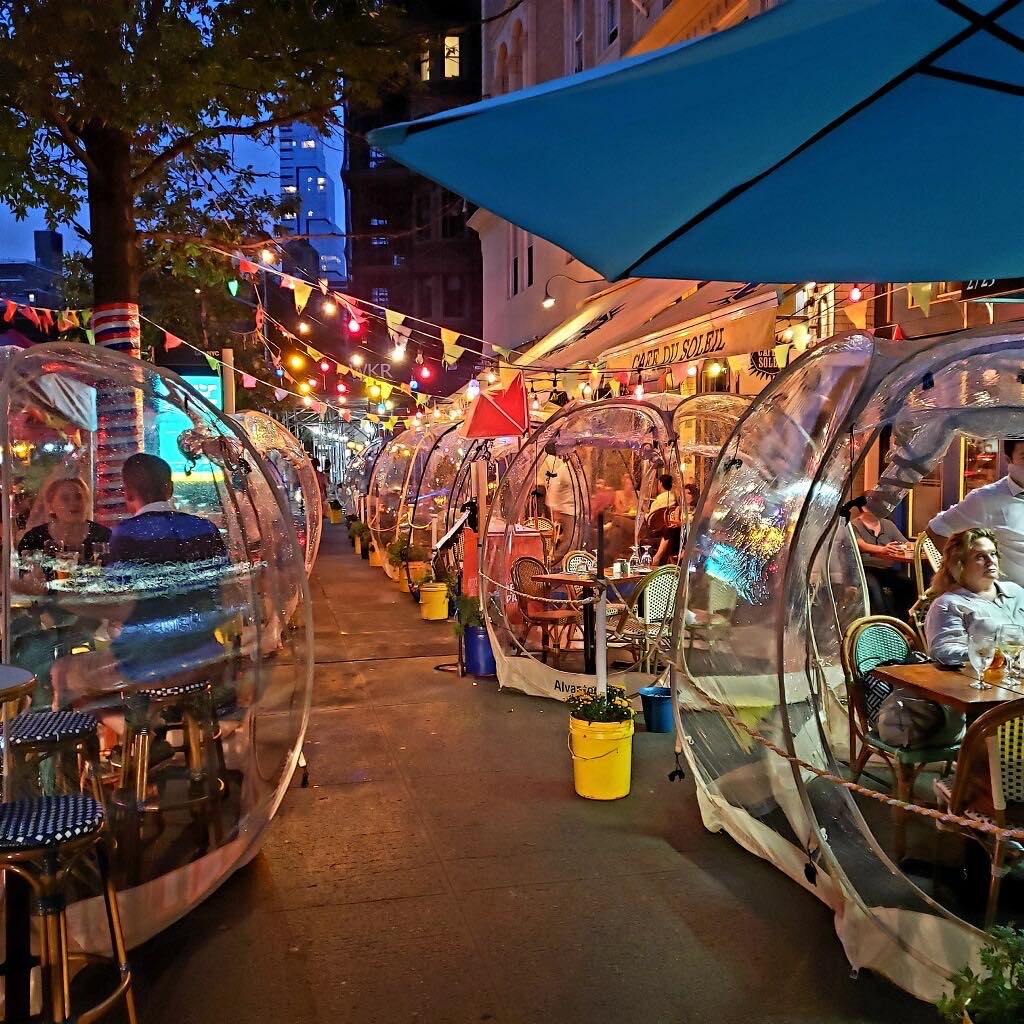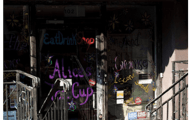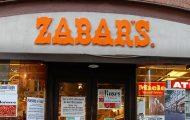
The outdoor dining bubbles at Cafe du Soleil, 2723 Broadway at 104th Street. C/o Cafe du Soleil
It was a lifeline for one of the city’s most critical industries. Over a quarter million people living in NYC are employed by the restaurant industry and in May 2020, New York City was on track to lose 100,000 of those jobs. Sensing catastrophe, New York City Council introduced emergency legislation to help restaurants utilize temporary outdoor space on public sidewalks and parking spaces, salvaging our economy and our deteriorating sense of normalcy. While we zoomed theater, bleached delivery bags, and applauded at 7pm, the prospect of returning to restaurants heralded much-needed hope.
Advertisement
Two years have passed, and our world’s condition has evolved. 85% of adults living in NYC are fully vaccinated. Only .27% of those 85% have ever been hospitalized for COVID (hospitalizations for the flu are 10x that amount). As we transition from pandemic to endemic, the restaurant industry debate is changing from “how do we keep a crucial industry alive?” to “how do we utilize the public space once loaned to private companies during a devastating pandemic?” Over the next six months, the Department of Transportation (DOT) and the Department of City Planning (DCP) will hear New Yorkers’ feedback as the Open Restaurants program becomes a permanent fixture in our city.
As you might imagine, the topic is hardly one sided.
On February 5, The Coalition United for Equitable Urban Policy (CUEUP) held a rally in the West Village called “Chuck The Sheds.” A slogan for the event reads, “Noise forever. Rats forever. Trash forever. Traffic forever. Impassable streets forever. Lives disrupted forever.” On their Instagram there is a compelling letter from Andrew Ansbro, President of the Uniformed Firefighters Association, an organization representing New York City Firefighters. In the letter, read to supporters at the event, Ansbro details several significant dangers associated with shed placement under the current Open Restaurants program. He writes, “sheds have narrowed the street to the point where we cannot safely and effectively raise ladders [to save residents] … If the street is narrowed by the placement of sheds to the point where the street is not much wider than a car it makes it difficult or impossible for us to set up a ladder/truck…” Ansbro’s open letter concludes by stating, “If you, or a loved one, has a shed in front of your building or on your block you should be concerned… lives are in danger.”
For news across the park visit EastSideFeed.com
Dissent has also spread across our community boards. For decades before the pandemic, community boards would approve or reject all proposals for sidewalk cafes. Those recommendations were based on unique circumstances and an intimate understanding of each individual neighborhood. Today, DOT and the DCP are looking to amend legislation to circumvent those obligations by categorizing sheds as “roadway cafes.” A bit south of us, at Community Board 2, they write that the Open Restaurants plan “utterly disregards critical public safety impacts of roadway cafés and equity issues for residents and businesses – all for the benefit of one industry.” They continue stating, “The Proposed Actions represent a fundamental change in that it expands the geography of eating and drinking establishments to the public realm without sufficient study of the impacts.” In bypassing Community Boards, DOT and DCP are likely to disregard unique layouts of each NYC street, cultural identities of communities, unique building structures and many other quality of life details that community boards are so accustomed to protecting.
Advertisement
According to CUEUP, 62% of NYC community boards voted against permanent Open Restaurants. Further violations noted by various community boards include obstructed street signs, parking violations, extending beyond storefronts, blocking resident entryways, emergency road lanes blocked, fire hydrant obstruction, utility hardware obstruction, bike lane seating, impeded pedestrian walkways, vermin, noise and garbage, among others.
Simultaneously, it shouldn’t be too shocking to note that there are many people who love the Open Restaurants program. Over the past two years, this program has had a significant impact on NYC’s job creation. The program has helped save over 12,000 restaurants during the pandemic. It has also helped create jobs. On average, for every ten tables added, a restaurant will hire two servers and a busser. The program also sits fondly in our collective memory. We remember how important these open restaurants were for us. We remember that when we cheered out our windows every night, we cheered on those restaurants.
Restaurant owners aren’t the only ones hoping to maintain the new status quo. Despite the effectiveness of our vaccines, there are those who, justifiably, continue feeling unsafe when entering a crowded bar or restaurant and they find refuge in outdoor dining. There are also individuals who have remained unvaccinated, for whatever reason, and rely on outdoor seating as their only outlet to dine out.
Advertisement
We are becoming torn on this issue. Restaurants and their lobbyists want to keep their new land. Property owners probably want that also — who knows how high rents will soar when they realize their tenants have permanently attained more square footage. Most of us are grateful to have had this Open Restaurants program over the past two years. But it is important to look at this situation objectively. We must acknowledge the trash, the safety concerns, the vermin, the homeless people sleeping inside skeleton shacks rotting away, and the residents who decry a degrading quality of life from so much noise. At the same time, we must acknowledge the beauty, the joy, and the relief this program has brought so many of us during an extremely difficult period in our lives. Both realities exist together. Our goal should be to have our cake and eat it too. Our restaurants need to prosper if they’re going to make us cake. And if we help them prosper, we’d prefer to eat our cake somewhere pleasant and safe, not in a bike lane next to garbage.




Every New Yorker I know loves outdoor dining. In addition to the improvement in the quality of our lives that sidewalk cafes bring, they also make our streets safer. People who object to them ought to move to the suburbs or to a retirement community in Florida, where life is calm and quiet.
Every New Yorker has witnessed dangers imposed upon it’s citizens by poorly designed and planned outdoor shacks. Firetrucks are of particular concern.
Surely there must be a way to make sure the bad ones comply with space and safety regulations or be torn down. Some will survive, some wont. We can have it both ways
How about this as an idea? You move to Bourbon St in New Orleans instead.
I was in favor of this when it was first proposed as a way to allow restaurants to stay open when indoor dining was not possible. And I was in favor of the one-year extension of this, even when indoor dining was available again, since restaurants had lost so much revenue and were closing left and right.
But I am definitely NOT in support of this as a permanent thing. First, restaurant owners have proven that they cannot be trusted to keep them clean and safe. Despite rules regarding the structures, many did not follow those rules, and the structures are not safe: how many times have we read of them being crashed into by vehicles? At least half a dozen. As for cleanliness, many, possibly even most, are filthy, and garbage collects around them – untended to by the owners. This, in turn, attracts rats. Lots of them.
Second, the whole idea behind this was to have some degree of social distancing, and open spaces with airflow. But far more than 50% of them are fully enclosed, allowing no air flow – and thus defeating the entire purpose of the concept. They are essentially newly built enclosed petri dishes for Covid, flu and other diseases.
Finally, helping restaurants get back on track was a great idea. But most no longer need that help (certainly not to the degree that they need this project to be perpetual and indefinite), and new restaurants are opening pretty quickly now, suggesting that the economic situation is turning in their favor.
The process for approving outdoor cafes – unenclosed and enclosed – was one of the few things the City did right, involving the local community, the community boards, and the DCA in a well-thought-out process. To simply “give” every Tom, Dick and Harry restaurant owner the right to take over pedestrian space, create unsightly, and often unsafe, structures that attract garbage (and rats), and also take over street space (which creates difficulties for emergency vehicles) is an unnecessary and foolish idea.
If a restaurant wants a cafe, they should go through the same process that all prior restaurateurs went through, which is not particularly burdensome, and balances the needs of all stakeholders: the community, the City, NYPD, FDNY, DOS, and others.
Why isn’t Ian one of our Deputy Mayors…..that’s what I’d like to know? He’s precisely the kind of concerned but savvy citizen we need more of and certainly holding public office versus the dreck, dross and detritus we end up putting into office term after term here, in D.C. and around the country. And while I’m feeling all alliterative — “key change” as Mel Brooks would say — what about Trump being vain, vapid, venal, vulgar and vile — and not once did I hear or see any of those descriptives used in
The Washington Post, New York Times nor emanating from the lips of news anchors on CNN, ABC, CBS, NBC nor on SNL, Fallon, Kimmel, Noah, Bee, or Colbert. And as if 5 Vs isn’t sufficient, the only man in the history of the world who lost money running not just one casino but THREE….is also venomous and vindictive. But, here’s the rub…Peter Thiel, a honest-to-God billionaire and accomplished man, is leaving the BoD of Meta (a.k.a. deFaced-book) — he a Stanford undergrad and a Stanford law school grad from San Mateo, CA — to serve the Republican party by working full-time to “advance the Trump agenda” across Senate and gubernatorial races in 2022. Seriously? A man who can actually recite the alphabet with his eyes open whilst sitting upright wants to dedicate himself to advancing that criminally negligent (see: caught ripping up official docs and taking a bunch of other docs home at night and then over to Manhole Cover, Florida) SOB’s agenda? You know what, I’ll have 3 more pieces of Charles pan-fried chicken, please. And here you thought I was writing my diatribe in the wrong spot….
Pete:
Thank you (I think…) I was asked to run for office (City council) many years ago, and both Scott Stringer and Jerry Nadler (both of whom I have known for over 40 years) offered to endorse me. But I turned it down. I really have no interest in it, given some of the things that are involved in it (not least “campaign finance”).
As for your “diatribe,” it IS a little off-topic, but I do agree with most of it. 🙂
Thanks!
It really blows my mind the argument of safety and community aesthetic.
First and foremost the scaffolding! It is the ugliest of NYC characteristics. As we all know also holds some political advantage to developers and property owners tax write offs. There should be less images of views from the sky, albeit the NYC skyline that is horrific when one looks at photos before air rights became a thing. There is nothing safe about having to walk closer to a stranger on the street, walk into a poll, or walk in the bike lane for the freedom to walk down a street that doesn’t feel like a cage. Especially considering people are profiting off such defacing poles of metal.
Secondly, the barricades, resembling cages, that block midtown streets for tourism despite its costly (literal and emotional ie mental health in a time when so many are disgruntle most likely because the cost of living continues to soar, wages not so, and many frustrated and confused people refuse to go back to a 9 to 17) effects on residents. Is this a logical use of our tax dollars? We should denormalise cages in the United States, no other first world country resembles such eerie communist military state in a war zone foreshadowing.
Regarding the comment of property owners raising rents because of the space; again this is something that we should all be lobbying against. How are the real estate laws not being dismantled?!
The U.S. dollar is a sovereign currency, which means the fear of being charged more needs to be shaken with the reality of what an actual democracy is. Change the real estate laws, and poof so many of these concerns are resolved, not so great for companies and their share holders but for people, you know the ones that allow economies to exist.
More jobs, more income, more space to enjoy my ridiculously over priced glass of vino, is a win for the people.
The city should be working for the people, is not logical reasoning what we seem to still dispute in the name of ‘law’?!
I’d love to see statistics of the dangers, show me actual probability. Id like to see that also paralleled with the statistics of our cousin first world countries that seem to enjoy side walk cafes, without having to stand up to smoke their cigarettes as the smoke blows back toward the table from the wind, sans action calls to safety. (eye roll emoji)
You want to talk to me about safety, Id say there is nothing safe about my morning runs in Riverside Park with the fumes of traffic from the highway, or the smell of burnt rubber from park ‘maintenance’ vehicles inside the park blowing right into my lungs, and yet there are rules for smoking cigarettes in an open park full of green goodness. No littering reinforcement, no smog reinforcement, but a cigarette will cost you a 50$ ticket and some tax dollars in bureaucratic paperwork.
Come on New Yorkers, lets use our logically reasoning.
There is a LOT to unpack here, but I am only going to address the first item, scaffolding.
It is incorrect to say that there are “tax write-offs” for scaffolding. In fact, the cost of installing and maintaining the scaffolding until work is done FAR outweighs any tax benefits there might be.
In fact, there are NO “tax write offs” for scaffolding. What is true is that there are instances in which the cost of erecting and maintaining scaffolding not SUBJECT to tax (a very different thing). And that is only when the work being done qualifies as a “capital improvement.” And given the new 2019 housing and rent guidelines, the definition of “capital improvement” has been narrowed considerably.
For example, scaffolding erected for the sole purpose of “pointing” a building or doing other necessary legally maintenance (the most common reason for putting up scaffolding) does NOT qualify as a capital improvement. Nor does some other legally required work including work related to landmark status. ONLY work that results in a defined “capital improvement” would lead to the non-taxability of the erection and maintenance of scaffolding. But given that scaffolding can cost $50-$200 per week (i.e., $2600-$10,000/year), even the tax SAVINGS is minimal.
Excellent article that articulates much of my own experience. If I may, there is one other thing that I’m surprised isn’t getting as much attention: the sheds are ugly. I loved them during the worst of the pandemic when I could at last go out to dinner again. But between them and the insane amount of scaffolding that covers our buildings, New York, once the handsomest and most prosperous-looking of cities, now appears to be a decaying shantytown.
Either a Street Shed or a Sidewalk Cafe – not both for one business.